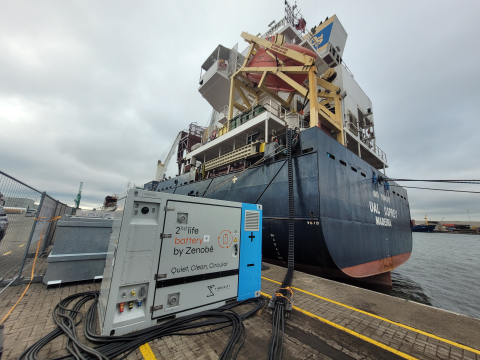
New shore power pilot project launched at Zuidnatie’s terminal in Antwerp
Zuidnatie and UAL kicked off a new pilot project, together with Zenobē, when the UAL Osprey was connected to shore power by means of a battery. This makes Zuidnatie the first terminal in Belgium to test shore power in this way on a seagoing vessel.
Many seagoing vessels currently use their own generators to produce electricity while sailing or stationary. Unfortunately, running diesel engines while in port can be detrimental to the environment. As a result, ships will soon be required to power themselves without relying on fossil fuels, a process known as cold ironing. However, not all areas have the necessary infrastructure to connect directly to the electricity grid. One possible solution to this issue is the use of a mobile battery.
In the pilot project, Zenobē used a second-life battery, a battery used in a previous life to power electric buses. Zenobe is ensuring that the battery gets a second life thanks to this project. In this way, the rare metals will remain in use here for over 20 years.
Shore power research
The aim of the project is to collect measured data on consumption and consumption peaks, something that has not yet been researched. Zenobē chose a 150 kWh battery, backed up by two generators, to capture and record the unprecedented peaks. In a second phase, the battery will be scaled up and these additional generators will no longer be needed. The battery will then be powered by Zuidnatie’s PV plant. The delivered voltage will be 400 volts and the energy will be brought on board by means of a cable package.
Commenting on the pilot project Robby Van Bunder, CTO Zuidnatie said, “The collaboration with Zenobē stemmed from a chance meeting with our Managing Director Stéphanie Feys and a delegate from VIL during a networking event. An exploratory conversation around green energy took place and since then we have been in contact with Zenobē for several projects, including this one. The big test finally took place yesterday afternoon and the first impressions are very positive. The test brings us another step closer to a green future, which we as a company are striving so hard for.”
In the long term, Zuidnatie want to offer this form of shore power to all shipping companies calling at the terminals. At a later stage, Zuidnatie plans to use the generated energy from its solar panels as a power source to charge the super batteries.
“Ports are ready to decarbonise and the technology is available today. With this pilot project at Zuidnatie and the Port of Antwerp, Zenobe is proving that batteries can support the path to net zero in port operations. With our most recent capital increase, Zenobe is well placed to support the Green Deal and the greening of all elements of port operations,” Steven Meersman Founder/Director Zenobe, said.
You just read one of our premium articles free of charge
Want full access? Take advantage of our exclusive offer




